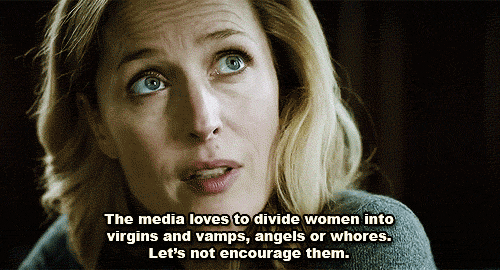The Fall is a joint BBC/Netflix drama series that tells the story of a string of murders that happen in Belfast, Northern Ireland. Unlike many murder-mystery series that rely upon twists in plot and prototypical elements like red herrings, The Fall wastes no time in revelling to the viewer who the serial killer is (Jamie Dornan) and who his law-enforcement nemesis is (Gillian Anderson). Because the series does not need to spend time trying to hide the identity of the killer, more attention is spent developing these two characters and exploring their psyche. Which is how The Fall, in my biased opinion, has crafted one of the most progressive, interesting, and dynamic female characters on television in the form of Anderson's Stella Gibson.
Stella is not just a competent detective, she is the best detective, the only one who can truly go head-to-head with Dornan's Paul Spector. She's smart and strong, and what's more, when she wants to sexually express herself, she does. Within the first episode of the series, we see Stella looking at another officer with interest, whom she then asks upfront to spend the night with her. In Markle's piece reviewing sexual scripts in Sex in the City, much time is spent on examining the ways in which the show displays typical male and female sexual scripts, and then subverts them (2008). Stella, much like Carrie and the other leads from Sex and the City, has sex when she wants, with whom she wants, and does not need commitment or emotional connection. However, unlike Sex and the City, in the The Fall, breaking from these scripts does not lead to a lack of repercussions for Stella. Markle points out that much of what happen in SITC happens in a post-feminist setting, where women can have sex like men, and not have to fear ostracization or an abusive partner (2008). When Stella's colleagues find out about her one-night stand, she is subjected to real-life character attacks, such as 'slut-shaming'. How those around Stella choose to address her sexual openness gives the show more of a realistic take on how sexual scripts play out, highlighting the reality of female sexuality.
Her dialogue, working in tandem with how her character has been crafted, clearly highlights the sexist nature of some of these scripts, and tears them down. Even though Stella is ostracized for her behavior, she isn't one to lay down and let this attack against her happen, and the viewer is led to sympathize with her as opposed to the men in the office who make her out to be a slut.
The Fall is full of moments like this. Mystery-dramas, as anyone who's had a chance to view them knows, are a troublesome genre in some regards for their heavy reliance on violence, most often committed against women, in the name of story development. While all the victims of Dornan's Spector are women, characters like Stella are there not only to give the presence of a strong female character, but also, in some cases, to give back the importance and character to the women who are victims of the serial killer. They are people too in this drama, not just casual asides, and they, much like Stella after he one-night stand, are subject to questions of innocence on the grounds of sexuality. Stella isn't having it, though.

Reference List:
Markle, G. (2008). “Can Women Have Sex Like A Man?”: Sexual Scripts In Sex And The City.Sexuality & Culture, 45-57

No comments:
Post a Comment
Note: Only a member of this blog may post a comment.